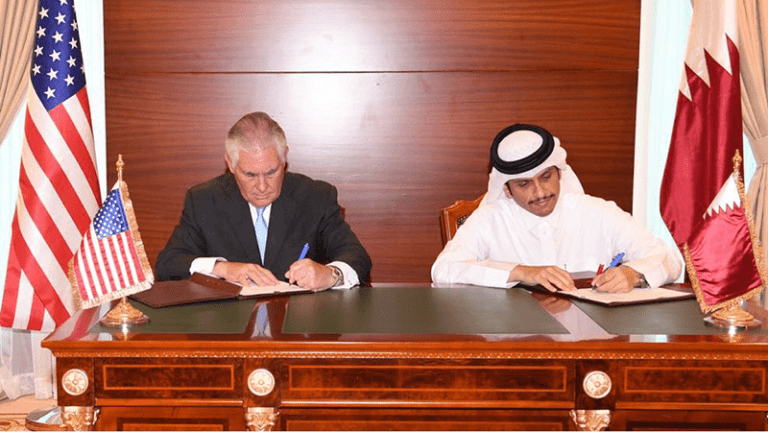
The Memorandum of Understanding (MOU) that US Secretary of State Rex Tillerson signed today with Qatar’s Foreign Minister Sheikh Mohammed bin Abdulrahman bin Jassim Al Thani about cooperation on fighting terror financing is arguably a game changer in the current Gulf crisis. According to the Qatari minister, “Qatar is the first country to sign a memorandum of agreement with the US.” For his part, Secretary Tillerson “praised Qatar for signing the deal, and for committing to the effort ‘to track down and disable terror financing’.” As the secretary heads to a meeting on Wednesday in Jeddah with the foreign ministers of the four countries blockading Qatar––Saudi Arabia, the United Arab Emirates, Bahrain, and Egypt––he bears with him what is arguably the best proof of Doha’s commitment to combat one of the greatest challenges of our times.
The MOU’s Importance
While the terms of the memorandum have not yet been made public, it is important to highlight the act of its signing as a welcome step in the right direction in a crisis that, with hindsight, many consider to have been unneeded and detrimental to the interests of all the members of the Gulf Cooperation Council. Yet from the beginning and until now, the GCC crisis called out for a political solution that would in the least safeguard Qatari sovereignty to conduct an independent foreign policy as well as save face for the countries that levied the original accusations without any evidence proving the purported Qatari malfeasance.
Thus, the memorandum provides a significant milestone on the road to a political solution that preserves GCC unity, stability, and prosperity. But, importantly, it also should be regarded as at least a partial culmination of Kuwaiti-American cooperation on mediating the crisis. Secretary Tillerson himself admitted the centrality of the Kuwaiti mediation effort, without which he would have been hard put to proceed in a purely GCC-centered kerfuffle.
Moreover, the memorandum should be considered as a reinforcement of the existing strategic partnership between Qatar and the United States not only to fight terrorism but also to preserve overall peace in the Gulf region. It indubitably involves all executive agencies and mechanisms in both countries so that its provisions may be carried out to the fullest extent possible by the largest number of institutions. As the announcement of the MOU also made clear, it is hoped that other countries in the region would embark on similar undertakings that could increase the vigilance necessary to fight and defeat all sources of extremism and terrorism that threaten their collective security.
Tillerson Takes Charge
The signing of the memorandum culminates a long and often confused American journey to help resolve the current crisis. On the road, the Trump Administration had to sort through ill-advised and ill-timed tweets by President Donald Trump, who took credit for supposedly calling Qatar out on supporting terrorism and urging other GCC states to challenge it. In the end, and after yet more dangerous interventions by the president in late June, it appears that cooler heads in the administration––specifically at the State and Defense Departments––have finally triumphed and reaffirmed the traditional American position of standing at equal distances from the United States’ allies in the Arabian Gulf and calling for GCC unity.
Indeed, what has become patently obvious is that the US Department of State, under the leadership of Secretary Rex Tillerson, is driving US policy regarding the current crisis. Beginning with the early and dangerous White House position, Tillerson was not enthusiastic about wading into the conflict, perhaps because of his newness to the job and inexperience as a diplomat. But every day that the crisis took a more ominous and unwelcome turn, he was ready with well-thought out and reasoned pronouncements that emphasized the importance of GCC unity and the necessity of de-escalation.
It was his demarche to the blockading countries to list “reasonable and actionable” demands from Qatar that led the four countries, at the end of June, to release their 13 conditions expressing their grievances. And when it quickly became obvious that these were difficult and unrealistic demands to execute, Tillerson expressed his frank opinion and again counseled restraint, urging mediation and unity. Finally, he decided to throw the full weight of his institutional position and of the administration behind the mediation effort after it became patently clear that resolving the Gulf crisis required America’s undivided attention.
No one can be sure of how things will develop over the next few days. But Tillerson’s upcoming visit to Jeddah has the potential of continuing the momentum started in Kuwait City, where he met with the original and tireless mediators, and continued in Doha, where he met with the ruler, Sheikh Tamim bin Hamad Al-Thani, after which Qatar’s foreign minister signed the MOU. How the blockading countries understand the memorandum and deal with this monumental achievement remains up to them, considering their ill-advised anti-Qatar behavior and policy pronouncements since last May. But if these countries are truly looking for a way out of the impasse––and are indeed ready to let this crisis end––they would do well to receive Tillerson with an equally open mind on mediation and reconciliation as he encountered in Doha.
The Needed Open-Mindedness
To be sure, what the Gulf crisis has wrought on all parties concerned has been detrimental to everyone’s interests. Only retreating from vitriolic rhetoric and ill-considered policy choices helps to preserve whatever is left of the unity necessary to make the GCC the alliance it always was intended to be. What would help GCC states achieve the coveted coherence within the community of nations are logical discussions about sovereignty and independent foreign policies within agreed alliance parameters, ones that avoid the dictation of choices. Finally, and importantly, these discussions may do well to include needed mechanisms for conflict management and resolution.

